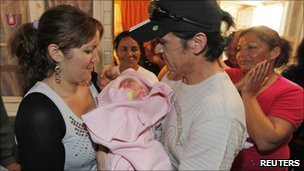 A further 28 rescued miners have been discharged from hospital in Chile in secret, a health official has said.
A further 28 rescued miners have been discharged from hospital in Chile in secret, a health official has said.Paola Neumann, head of regional health, said their release was not publicised in order to protect them and their families.
Just two of the 33 men who were freed in an operation that was viewed around the world remained in hospital, she told reporters.
They would be transferred to different hospitals, she added.
Dr Neumann said one was suffering from a dental infection and the other had vertigo.
She described vertigo as like a dizziness that made it difficult for the patient to maintain balance and walk properly.
The first three of the miners were allowed home late on Thursday, and Dr Neumann said a decision had been taken to discharge the others on Friday without telling the media.
"This is not necessarily because of the media. Please don't take it personally," she told reporters.
The 33 miners spent 69 days trapped deep underground after a cave-in at the San Jose mine, near Copiapo in northern Chile's Atacama region.
For 17 days no one knew if they still lived, until a probe lowered through a narrow bore hole made contact with them.
They had survived by eking out rations meant to last only a few days.
Supplies were then lowered to them while they waited for a rescue shaft to be drilled to them, 624m (2,047ft) below ground.
'Waiting for death'
There have been scenes of jubilation in Copiapo as the miners released from hospital have returned home to be greeted by relatives, friends and neighbours.
Ariel Ticona and his wife Elizabeth Segovia hugged their baby girl Esperanza, born while Mr Ticona was trapped underground.
None has yet given a detailed account of their time trapped in the mine. Some of those who have spoken say that all 33 have agreed not to speak about their experiences underground.
Despite the pact, Juan Illanes described the first 17 days of the ordeal as a nightmare, before they were discovered by rescue workers.
Speaking to the BBC, Omar Reygadas said he was likely to return to mining, the only occupation he knew.
"That's my life. As footballer plays for as many years as his body allows him, I will go back to the mine because that is simply my job. My life is working in a mine... I love working underground and I know I am coming back."
By contrast, Richard Villarroel thought he would be entombed forever.
"We were waiting for death," Mr Villarroel, 26, told the Washington Post.
"We were wasting away. We were so skinny. I lost 26lbs (11.8kg). I was afraid of not meeting my baby, who is on the way. That was what I was most waiting for."
The government has promised the men it will help find them new jobs although their salaries are only due to be paid for another month.
Health Minister Jaime Manalich said the miners would all be closely monitored over the next six months and he predicted that tough times lay ahead of them.
"They have to adapt to a new life. Therefore we are prepared to stay with them and to work at least in the next six months," he said.
Edison Pena, who was released from the Copiapo hospital on Thursday, has expressed his anger about the accident, saying that when they were trapped he thought they were going to die.
"Why do these things have to happen? Because the employer wants to make money," Mr Pena said.
Speaking to reporters outside his home, he said he was worried about what the future had in store for him and his colleagues.
"But I'm afraid in three months, when the interviews are over, it may be difficult for me and my colleagues to find a job. I may end up selling sweets in the town square," he said.
The men have reportedly had offers ranging from invitations to attend football matches in Europe, to holidays, to television appearances.
They have even been invited by President Sebastian Pinera to form a football squad and play a team of government officials.



